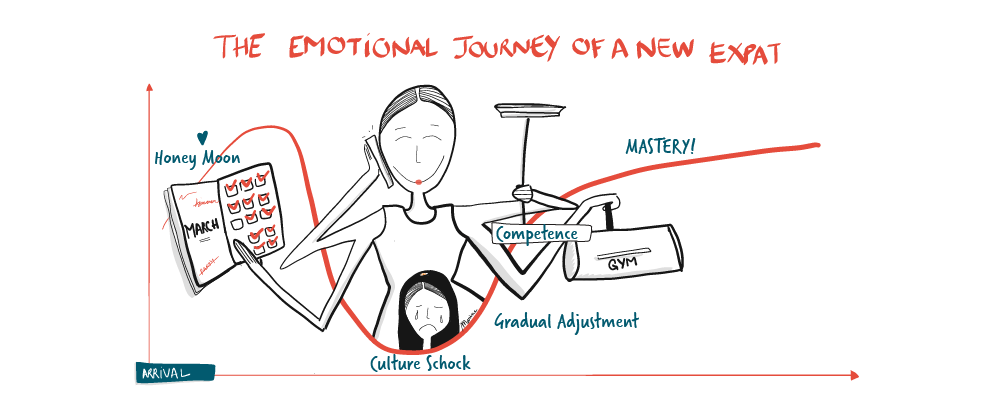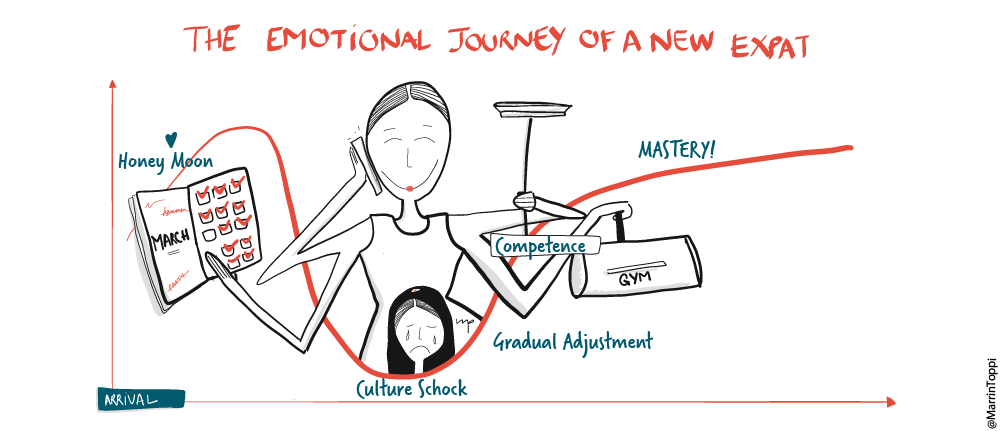To Be an Actor of your Expatriation
A year ago, I moved to Hong Kong and started my life as an expat. My experience of this year turned out to be very positive thanks to what I have learnt and to all the new people that I have met, but it has also been a truly challenging year.
As a coach, I would like to share with you a few tips that would help you to become an actor of your expatriation.

The Emotional U-shaped Curve of Expatriation : to acknowledge it and to better live it
Have you ever heard of that famous emotional U-curve of an expat?
I was aware of it when I began my expat journey, and it has remained very relevant throughout the year, to me as well as to my entourage and to my coachees.
From the first phase of the « honeymoon » to the last where you finally found a balance and acquired a new “mastery” state of mind, you would have gone through a “cultural shock”, followed by a “gradual adjustment” and the “mobilization of your competences”.
This curve descends after the cultural shock and then rides up gradually… and fluctuates throughout the whole process until you reach the new “mastery” state of mind.
In Hong Kong, it is always easy to network and to meet new people. Most of the time, people put on a good face, and it is not easy to see that you are not the only one to experience the ups and downs of that curve.
Share your difficulties and you will understand that most of the expats are going through the same thing.
The emotional fluctuations that you’re going through could also be easily understood by people from your host country. Identify trustworthy people and dare to express yourself! A good start, in my view, is to find the support that you need.
Evaluate where are your needs thanks to Maslow’s pyramid
Another well-known model is the Maslow’s hierarchy of needs.
The model is often displayed as a pyramid. At the bottom of the pyramid are the physical needs : the basic requirements for safety and security.
Going up the pyramid comes the psychological and social needs: the needs of belonging, self-esteem and self-realization.
In my opinion, the Maslow model is a good tool to identify your needs and to become an actor of your expatriation.
Arriving in a new country, it is necessary to fulfill the basic needs of physical requirements (food, warmth, health…) and of safety and security (finding a decent place to live…). Connecting with people could be relatively easy: by joining a hobby group, connecting to other expats etc.
But what about the need of self-esteem when you are abroad? For people who work: is your work helping your self-esteem to grow? And for people who don’t work (which is the case for most of the spouses), how can you fulfill that need of self-esteem ?
As for the self-realization need: what could it be for you?
In order to enjoy your expatriation, you have to be able to answer these questions. It could also be the subject of a life coaching.
Evaluate where your needs are and what they mean for you will then enable you to transform an uncomfortable situation to a fulfilling experience.
To become an actor of your expatriation : what to do with that blank page
Instinctively, human beings tend not to like significant change. However philosophers from Antiquity (notably the Greek) to modern days (the so-called Mindfulness school) all teach us that experiencing change is precisely being in the now, being alive.
It is easy to avoid change in our everyday rituals, to stay within our entourage and to stick with our long-time forged identities from back home. Expatriation invites us to « let go » of these rituals, identities and habits and to explore new ones.
Expatriation is an opportunity to reinvent ourselves: how to better allocate our time and to choose with whom we want to hang out? How to explore our inner values and to realize our most precious dreams? How to work on the renewal of ourselves?
« As the suns that are young again climb in the sky, after they’ve passed through the deepest of drownings »
Charles Baudelaire
By Clémentine Pons
September 4, 2018



